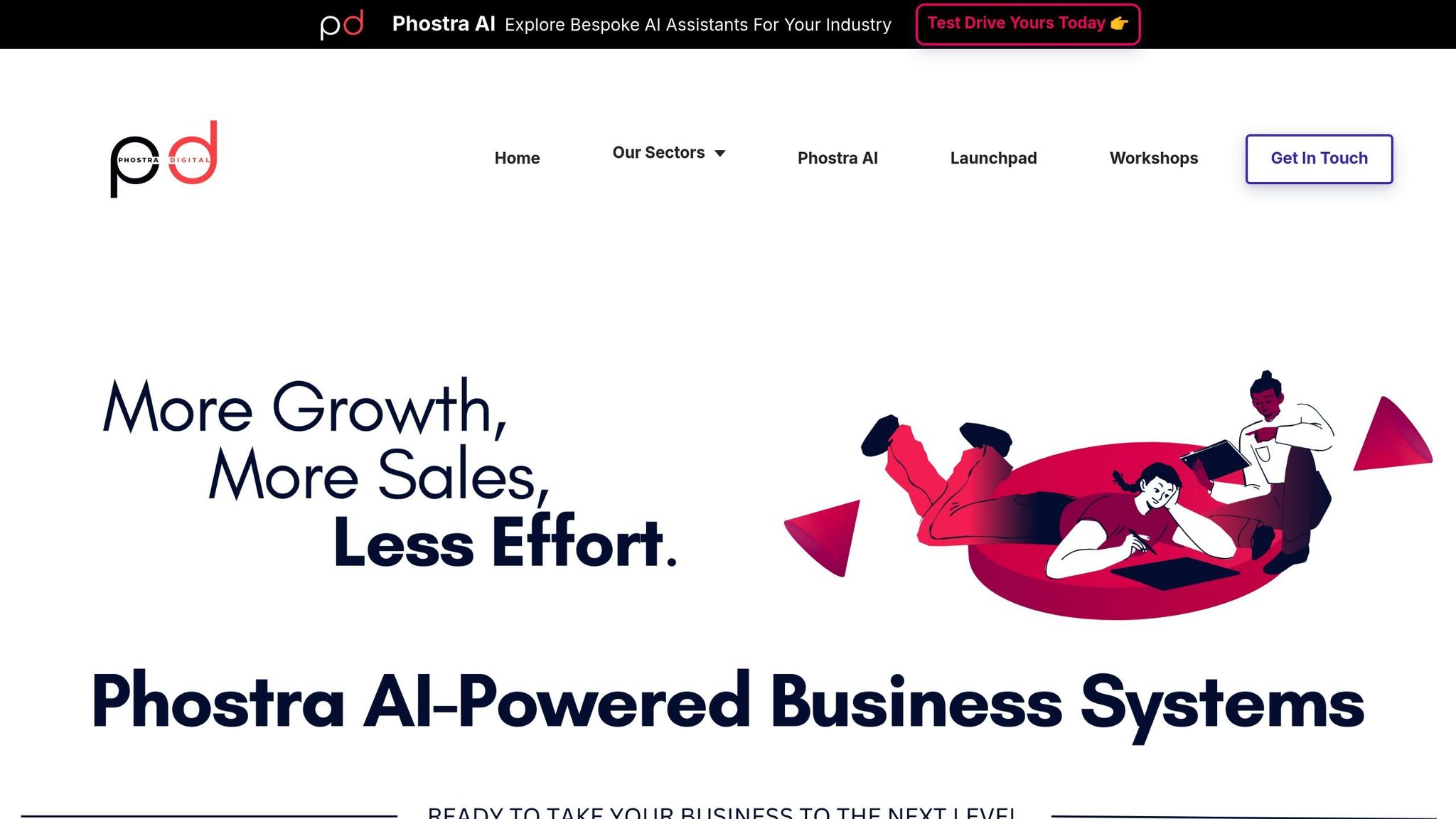AI can transform your business by improving efficiency and driving growth. But before diving in, ensure you're ready. Here's a quick checklist to assess your AI readiness:
- Data Quality: Accurate, complete, consistent, and up-to-date data is essential. Poor data costs businesses an average of £12 million annually.
- Data Protection: Ensure compliance with GDPR and implement privacy-by-design, regular audits, and access controls.
- System Compatibility: Verify your IT infrastructure supports AI with scalable storage, processing power, and API integration.
- Team Skills: Evaluate your team's technical, domain-specific, and soft skills. Address gaps through training and workshops.
- Leadership Alignment: Set clear business objectives, secure management support, and establish ethical AI guidelines.
Quick Overview
| Area | Key Focus | Why It Matters |
|---|---|---|
| Data | Quality, protection, standards | Drives accurate AI insights |
| Infrastructure | Scalable systems, cloud, hardware | Supports AI deployment and growth |
| Team | Skills assessment, change management | Ensures smooth adoption and usage |
| Leadership | Objectives, ethics, stakeholder buy-in | Aligns AI with business goals |
Start small with pilot projects, measure success using clear metrics like cost savings and customer satisfaction, and scale gradually. AI isn't just about technology - it's about aligning your data, systems, and people for success.
AI Readiness - The Simple Truth Most Companies Miss
Data Requirements
Good data is the backbone of effective AI. Poor-quality data costs organisations an average of £12 million annually, underscoring the importance of proper data management. This sets the stage for IT and team readiness.
Data Standards
AI systems thrive on data that meets these key standards:
- Accuracy: Remove errors and duplicates for reliable results.
- Completeness: Ensure all necessary information is included.
- Consistency: Use standard formats across all systems.
- Timeliness: Keep data up-to-date with regular updates.
"Data quality is the foundation of any successful AI initiative. Without it, the insights generated can be misleading or entirely wrong." - John Doe, Data Scientist, Tech Innovations Inc.
Following these standards naturally strengthens data protection efforts.
Data Protection
Around 60% of businesses fail to fully comply with data protection laws. To address this, consider these steps:
- Privacy by Design: Build protection measures into AI development from the start, focusing on data minimisation and purpose limitation.
- Regular Audits: Conduct quarterly reviews of data processing to ensure compliance.
- Access Controls: Use role-based permissions and audit trails to tightly manage who can access data.
"Data protection should be a fundamental part of any AI strategy, ensuring that personal data is handled responsibly and in compliance with GDPR." - Jane Doe, Data Protection Consultant, GDPR Compliance Solutions
Compatibility between systems further supports these efforts.
System Compatibility
For smooth AI integration, existing systems should meet the following criteria:
| Aspect | Requirements | Impact |
|---|---|---|
| API Integration | REST/GraphQL support | Enables seamless data flow |
| Data Format | Standardised structures | Ensures consistent processing |
| Processing Power | Sufficient computing resources | Handles real-time analysis |
| Storage Capacity | Scalable infrastructure | Manages growing datasets |
Using frameworks like the DMBOK can help align your data and systems with AI goals.
IT Infrastructure Needs
A solid IT infrastructure is essential for implementing AI effectively. Companies with advanced IT setups often experience a productivity boost of up to 40%. This infrastructure supports the deployment of data and team strategies, ensuring that cloud services, hardware, and future plans align smoothly with AI initiatives.
Cloud Requirements
Choose a cloud provider that offers flexible storage, sufficient memory, strong connectivity, and dependable backups. Hybrid cloud solutions often strike a good balance between performance and cost.
"The right hardware and software are crucial for businesses looking to leverage AI effectively." – John Doe, AI Solutions Architect, Tech Innovations Inc.
Hardware Specifications
High-performance GPUs are a must for demanding AI tasks. Entry-level options like the NVIDIA T4 are priced around £300, while top-tier models such as the NVIDIA A100 can cost over £10,000. Beyond GPUs, make sure your CPU, memory, and storage configurations can handle AI frameworks like TensorFlow and PyTorch.
Growth Planning
Keep these factors in mind as you scale:
- Process Capacity: Evaluate your current needs and plan for additional capacity as workloads increase.
- Storage Expansion: Opt for scalable, tiered storage solutions with effective archival options.
- Network Capacity: Build in redundancy and load balancing to manage higher traffic levels.
Cloud-based, pay-as-you-go models can help minimise upfront costs, allowing you to adjust resources based on actual demand.
Team Preparation
Implementing AI successfully isn't just about having the right technology - your team needs to be prepared to embrace and work with these new tools.
Skills Assessment
Start by evaluating your team's understanding of AI and their technical abilities. Focus on these key areas:
| Skill Category | Required Competencies | Training Approach |
|---|---|---|
| Technical Skills | Data analysis, basic programming, AI tools usage | In-house workshops, online courses |
| Domain Knowledge | Industry-specific AI applications, relevant use cases | Case studies, peer learning |
| Soft Skills | Critical thinking, problem-solving, flexibility | Team exercises, mentoring |
Look for gaps in these skills that could slow down your AI rollout. For example, companies like Phostra Digital provide hands-on AI workshops tailored to help teams gain practical know-how in areas like database management, workflow automation, and AI tool integration.
Once you've identified these gaps, it's time to focus on how to guide your organisation through the changes AI will bring.
Change Management
A well-planned approach to change management is key to ensuring a smooth AI adoption process. Here are some strategies to consider:
- Transparent Communication: Keep your team informed about the goals of AI implementation and how it will affect their daily work.
- Step-by-Step Rollout: Begin with smaller projects to build trust and show the benefits of AI in action.
- Support Systems: Set up mentorship programmes and create dedicated spaces - like Slack channels or regular Q&A sessions - where employees can voice concerns and get help.
Monitoring progress and gathering feedback regularly will help you spot and address resistance early. You can also appoint AI champions in each department to encourage adoption and help integrate AI into everyday tasks.
sbb-itb-1f44f5f
Planning and Leadership
Strong leadership and clear planning are essential for achieving success with AI.
Business Objectives
AI initiatives should align closely with organisational goals, addressing both immediate needs and long-term strategies. A structured framework can help map AI capabilities to specific business results:
| Business Area | AI Objective | Expected Outcome | Success Metric |
|---|---|---|---|
| Sales Process | Automate lead engagement | Improved efficiency in conversions | 30% increase in conversion rates |
For example, a Phostra Digital finance client saw a 30% rise in conversions in 2023 by integrating AI into their sales strategies. This success underscores the importance of setting clear objectives. Once these objectives are in place, securing committed support from management becomes crucial.
Management Support
Involve key stakeholders early on by organising workshops and providing clear, consistent updates. Transparency about milestones, costs, ROI, and challenges helps secure their ongoing support and ownership. Beyond gaining leadership backing, it's also important to focus on ethical considerations for deploying AI responsibly.
Ethics Guidelines
Develop strong ethical frameworks to ensure AI systems are used responsibly. McKinsey research shows that while 70% of executives recognise the importance of ethical AI, only 15% have formal frameworks in place.
Key Areas to Address:
-
Data Privacy and Security:
- Enforce robust data protection measures.
- Ensure compliance with UK data protection laws.
- Conduct regular security audits.
-
Fairness and Transparency:
- Assess AI systems regularly for bias.
- Keep detailed records of how AI decisions are made.
- Create channels for stakeholder feedback.
"Ethical AI is not just a compliance issue; it's a business imperative that can drive trust and innovation." - Dr. Fei-Fei Li, Co-Director of the Stanford Human-Centered AI Institute
Consider adopting established frameworks like the EU's Guidelines on Trustworthy AI. Setting up an ethics committee can also help oversee AI initiatives and ensure accountability throughout the process.
Implementation Steps
Building on your AI readiness assessment, here's a step-by-step guide to testing, measuring, and expanding your AI solutions. With your data, IT infrastructure, and team in place, you can confidently move forward with implementation.
Initial Testing
Begin with a pilot programme to test AI solutions, reduce risks, and fine-tune the system for better results.
| Testing Phase | Duration | Key Activities | Success Indicators |
|---|---|---|---|
| Pilot Setup | 4–6 weeks | System configuration, team training | Technical readiness |
| Trial Period | 3 months | Limited deployment, data collection | Performance metrics |
| Assessment | 2 weeks | Results analysis, stakeholder feedback | ROI evaluation |
For instance, a client of Phostra Digital in the financial services sector used a pilot programme to test an AI-powered customer service chatbot. The chatbot initially handled basic enquiries, which helped refine its performance before expanding to more complex tasks. After the pilot, it’s crucial to establish clear metrics for measuring success.
Performance Metrics
Once the pilot is complete, evaluate performance and plan for a phased rollout. Focus on measurable outcomes that align with your business goals:
- Customer satisfaction levels
- Response time improvements
- Cost savings percentages
- Revenue impact figures
- Resource efficiency rates
Use automated dashboards and regular reports to track these metrics. For example, the financial services company saw a 25% boost in lead conversion rates and a 15% drop in customer service response times.
Expansion Process
After confirming success through testing and performance reviews, expand AI across departments gradually. This controlled approach ensures stability and effective scaling.
"Scaling AI solutions requires not just technology, but a cultural shift within the organisation to embrace data-driven decision-making." - Jane Smith, AI Strategy Consultant, Phostra Digital
Key points to consider during expansion:
-
Department Prioritisation
Start with departments that can gain the most from AI with minimal disruption. Allocate resources to these areas first. -
Resource Allocation
Provide adequate support for each phase, including technical upgrades, staff training, documentation, and dedicated support teams. -
Cross-Department Collaboration
Share lessons learned from successful implementations to encourage collaboration and improve outcomes across teams.
Phostra Digital Services

When working through your AI readiness checklist, it's worth considering services that make implementation smoother and more efficient.
Phostra Digital specialises in AI solutions designed to deliver measurable results while keeping your operations running smoothly.
Lead Management Tools
Phostra Digital's lead management suite combines AI-powered engagement with automated follow-ups, helping businesses optimise their sales and customer interactions:
| Service Component | Key Features | Business Impact |
|---|---|---|
| SMS Automation | AI-driven follow-ups, lead qualification | Up to a 30% boost in lead conversion rates |
| Voice AI Assistant | 24/7 call handling, appointment booking | Improves customer interaction and simplifies scheduling |
| CRM Integration | Automated logging, smart segmentation | Cuts down manual tasks and organises data more effectively |
For example, in March 2023, a real estate client reported a 30% increase in lead conversions after implementing Phostra Digital's automated follow-up system.
AI Setup and Training
Phostra Digital also offers interactive AI workshops tailored to practical applications:
- AI Foundations (£500): 1.5-hour session for up to 10 participants
- AI Enhanced (£750): 2-hour session for up to 15 participants
- AI Mastery (£1,200): 3-hour session for up to 20 participants
"We've worked with businesses across finance, real estate, legal, and high-ticket sales, helping them automate lead engagement so no opportunity is missed." – Phostra Digital Team
In addition to training, Phostra Digital customises AI tools to meet the specific needs of different industries.
Sector Solutions
Phostra Digital's industry-focused solutions are designed to tackle specific challenges while integrating seamlessly with your existing workflows:
-
Solar & Renewable Energy
- Automated quote follow-ups
- Scheduling optimisation for installations
- AI-driven processing for finance applications
-
Financial Services
- Streamlined handling of mortgage enquiries
- Automated support for loan application processes
-
Real Estate
- Assistance with property enquiries and scheduling viewings
- Reactivating dormant buyer databases
These solutions work with existing CRM systems and adapt to unique business processes. For instance, the voice AI assistant can handle property enquiries around the clock, qualify leads, and schedule viewings, significantly improving response times and efficiency.
Next Actions
Checklist Summary
Before diving into AI implementation, ensure these critical elements are in place:
| Area | Key Requirements | Success Indicators |
|---|---|---|
| Data Readiness | Clean, organised datasets | Standardised formats, GDPR compliance |
| Infrastructure | Cloud capabilities, hardware | Scalable systems, adequate processing power |
| Team Capability | Digital literacy, AI knowledge | Completed basic AI training |
| Leadership | Clear objectives, ethical guidelines | Documented AI strategy |
For example, Smith's Pet Foods identified a gap in their team's AI knowledge during an internal review. After attending a one-hour workshop by Phostra Digital in March 2023, their staff successfully incorporated AI tools into their daily workflows.
Getting Started
Use the checklist as a roadmap for your next steps:
- Assess your current setup: Review existing systems, workflows, and team skills to identify how AI can fit in.
-
Schedule a consultation: Get expert advice on your AI readiness. Phostra Digital provides free assessments to help you spot automation opportunities and address challenges.
"We don't just set up AI and walk away. We make sure you understand how to use it, scale it, and see real results." - Phostra Digital
- Develop a timeline: Plan for a 2-4 week pilot phase, team training, system integration, and setting performance benchmarks.
Start with smaller projects to test and refine your approach. This gradual method ensures a smoother AI rollout and reduces risks.


